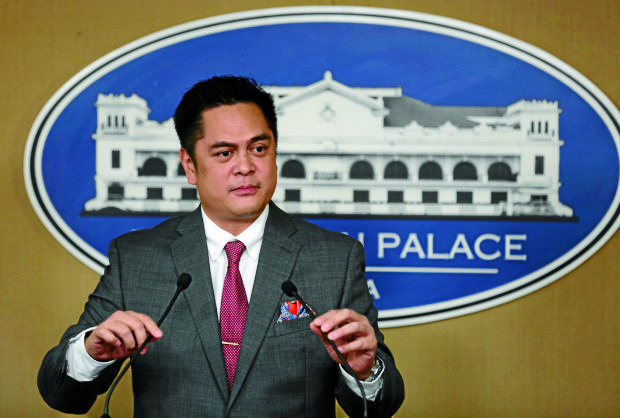
Communications Sec. Martin Andanar answers questions in a press briefing held in Malacañang.
INQUIRER FILE PHOTO/JOAN BONDOC
Malacañang is confident the two chambers of Congress will be able to reconcile their differences over the government’s P3.767 trillion budget for 2018 and pass the measure before the year ends.
“At the end of the day, I believe it [will] not be reenacted,” Presidential Communications Secretary Martin Andanar said on Saturday after Speaker Pantaleon Alvarez suggested the 2017 budget may be reenacted because of the differences of the two chambers.
“I am pretty sure a resolution [will] be found just like [previous] bicameral conferences,” Andanar said.
P3.767 trillion
The House of Representatives passed the Duterte’s administration’s proposed P3.767-trillion budget on Sept. 26 while the Senate also approved the P3.767-trillion budget intact on Nov. 29.
But the Senate realigned key items in the government’s proposed budget, including P1.4 billion for the war on drugs and P50.7 billion for for right-of-way acquisitions.
Both houses convened a bicameral conference committee on Thursday but, the following day, Alvarez declared: “We at the House of Representatives have agreed to take a hard stance on this matter.”
The speaker demanded that the Senate restore the funds it realigned because “that’s what we want to pass” and the House would prefer a reenacted 2017 budget if the Senate does not agree.
Under a reenacted budget, government agencies may spend uncommitted funds on whatever they want because the project for which it was allocated would already have been completed.
Possibility
But Sen. Loren Legarda, chair of the Senate Committee on Finance, dismissed the possibility of a reenacted budget.
“Everything can be discussed and we are doing our best to fund those that need funding like education, the military, farmers and fisherfolk, teachers, infrastructure and security,” she said.
Legarda said senators are open to restoring the DPWH’s allocation for right-of-way payments for ongoing projects and those that have no legal issues.
“The issue is simple. We will restore the budget for ongoing or new projects that have no right-of-way issues. But for those with legal issues, why should we fund it?” Legarda asked.